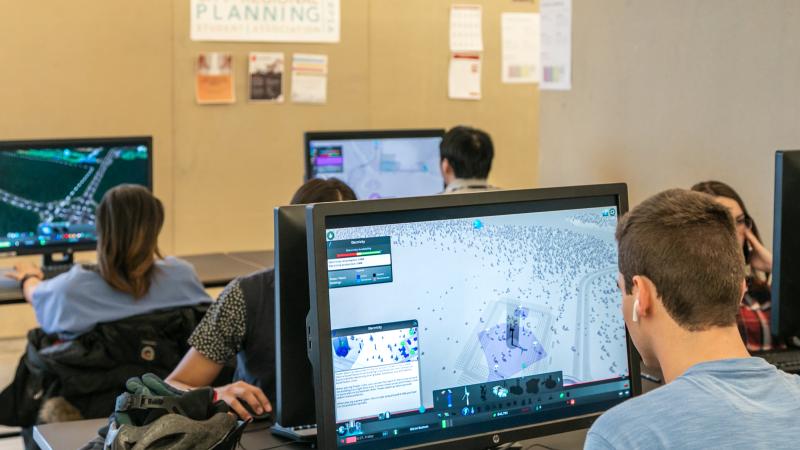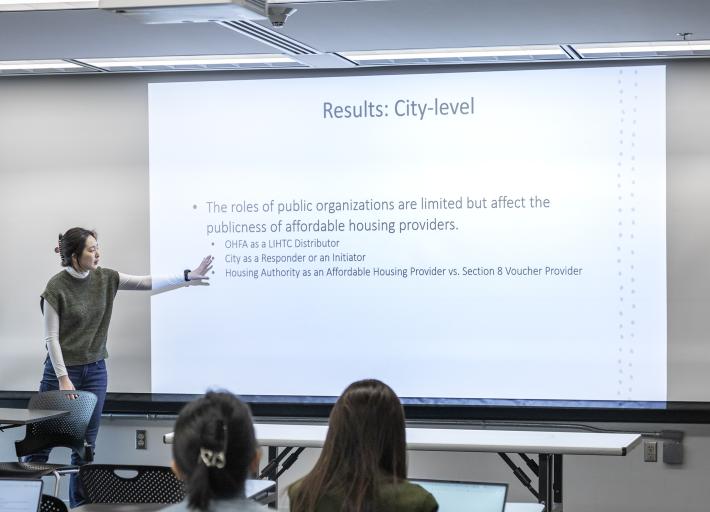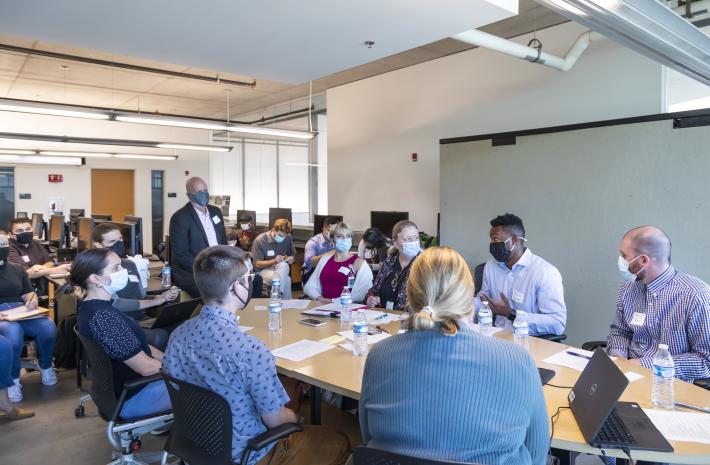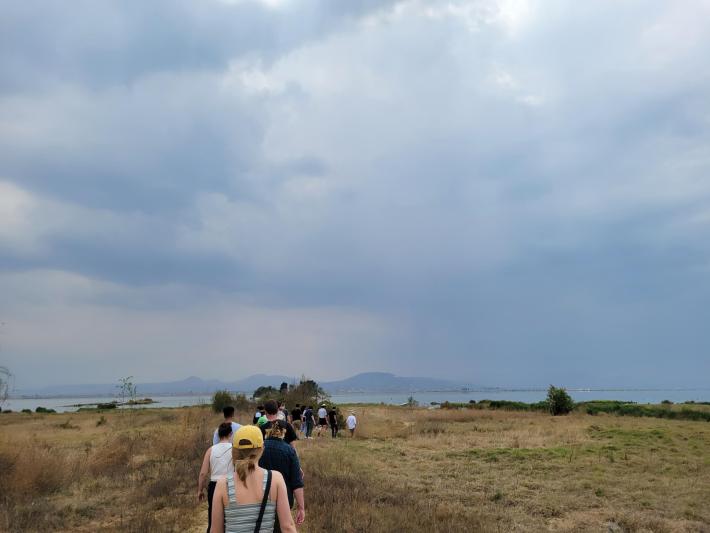Bachelor of Science in City and Regional Planning
The Bachelor of City and Regional Planning program provides students with the academic knowledge and technical skills to ensure our cities are equitable, inclusive, sustainable, and resilient.

Bachelor of Science in City and Regional Planning
Today most people in the world live in cities. The urban planning professional is essential to help guide and shape the future quality of life for all people living in urban communities. Urban planning can be complex and difficult, and urban planners deal with big challenges such as climate change, economic and social inequality, and inclusive infrastructure planning. Students in planning learn about topics like land use planning, transportation, sustainability and resiliency, regional economic development, social justice, food systems, planning for housing, and equity planning.
The BSCRP at Knowlton blends liberal arts with training for professional practice, fostering capability in history, law, physical planning, communication, public participation and advocacy, forecasting, and data analysis.
At the heart of our planning program are studio courses where students engage in real-life planning projects that make important contributions throughout Ohio. These studios hone skills and apply knowledge gained in the classroom to real-world contexts. Our students work alongside planning professionals to create solutions across a range of topic areas. Students gain experiences that enhance resumes, bolster work portfolios, and make graduates of our program highly competitive for positions in planning and for admission to top graduate schools.
Ohio State’s BSCRP alumni are visionaries and advocates who use technology and tools to help communities thrive. They ensure that communities offer quality choices for where and how people live by helping leaders and citizens achieve a balance of equity and new development, essential services, environmental protection, and innovative change.
Since these concerns are global, the BSCRP program at Ohio State offers a broad and evolving set of travel programs in such places as Belize, Taiwan, Europe, and Latin America.
As a BSCRP student at Ohio State, students gain entry to the profession of 50,000 practicing planners in the U.S.
Learn more about career services for city and regional planning students
Degree Options
Minors
City and Regional Planning offers an undergraduate minor that is an ideal supplement to majors in geography, landscape architecture, civil engineering, or other related disciplines and can gain exposure to history, theory, and methods in city and regional planning.
Learn more about the City and Regional Planning minor
Dual Degrees and Second Majors
Students interested in the Bachelor of City and Regional Planning can pursue dual or second major. These programs can help students meet career goals, prepare them for graduate school, or advance an interest in the field.
Learn more about dual degrees and second majors
Global-Option
Global-Option Knowlton is a curriculum enhancement program that allows Ohio State students to acquire documented international expertise integrated into participating majors without adding time to graduation.
Learn more about Global-Option Knowlton
Accredited and Comprehensive
This BSCRP degree is accredited by the Planning Accreditation Board. Students take courses in several areas. You will explore analytical methods as well as social and natural sciences. Our BSCRP program also prepares students for intensive graduate programs that further develop skills. If continuing with the MCRP, students may reduce the MCRP’s time through the BS/MCRP program.
CTA Links: Request Info / Visit / Apply (UGRAD)
Curriculum
The program for a Bachelor of Science in City and Regional Planning leads to a four-year professional undergraduate degree. The degree qualifies graduates to sit for certification by the American Institute of Certified Planners after just three years of work as a planner following their bachelor's degree.
The program combines a General Education Curriculum (GE) with a major tailored to the profession. The major is divided into required and CRP elective courses, and into lecture classes and studio courses. Students take the required major courses and select from the menu of GE and elective major courses in line with their interests.
Overview
| Requirement | Credit Hours |
|---|---|
| Required Pre-Major Courses | 10 |
| Core Major Requirements | 46 |
| City and Regional Planning Electives | 21 |
| Themed Elective Selections | 9 |
| Open Elective Selections | 9 |
| General Education Requirements | 32 |
| Total | 121 |
Required Pre-Major Courses, 10 credit hours
| Course Number | Course Name | Credit Hours |
|---|---|---|
| KNOW 1100 | Survey Class | 1 |
| CSE 1111 | Introduction to Computer-Assisted Problem Solving | 3 |
| ECON 2001.01 | Principles of Micro Economics | 3 |
| PUBAFRS | 4310 | 3 |
Core Major Requirements, 46 credit hours
| Course Number | Course Name | Credit Hours |
|---|---|---|
| CRPLAN 2000 | Introduction to City and Regional Planning | 3 |
| CRPLAN 2100 | History and Law | 3 |
| CRPLAN 2110 | Creating Innovative Cities | 3 |
| CRPLAN 2600 | Designing Communication | 4 |
| CRPLAN 3000 | Planning Resilient Environments | 3 |
| CRPLAN 3100 | Analyzing the City | 3 |
| CRPLAN 3200 | Placemaking | 4 |
| CRPLAN 3300 | Planning for and With People | 3 |
| CRPLAN 3150 | Digital Design and Analysis | 2 |
| CRPLAN 3600 | Land Development | 3 |
| CRPLAN 4900 | Plan Making | 6 |
| CRPLAN 4910 | Realizing the Plan | 6 |
| CRPLAN 4950 | Professional Planning Skills | 3 |
City and Regional Planning Electives, 21 Credit Hours
Five thematic clusters provide students with direction in developing a focal interest. However, students may choose courses from within and between thematic clusters to fit career goals.
Themed Elective Selections, 9 credit hours
Nine hours may be taken outside the section from related areas. A completed minor in any of the following areas can also be applied toward CRP Electives: Architectural Studies, Aviation Studies, Business, Design Thinking, Economics, EEDS, GIS, Geography, Global Public Health, Inequality and Society, Landscape Architectural Studies, Leadership Studies, Nonprofit Management, Public Policy, Real Estate, or Society and Environmental Issues.
Open Elective Selections, 9 Credit Hours
Up to nine hours may be taken outside the section without restrictions.
General Education Requirements, 32 credit hours
| Course Number | Course Name | Credit Hours |
|---|---|---|
| ACADAFF 1201 | GE Launch Seminar | 1 |
| Foundations: Writing and Information Literacy | 3 | |
| CSEE 1111 | Foundations: Mathematical & Quantitative Reasoning/Data Analysis | x |
| Foundations: Literary, Visual and Performing Arts | 3 | |
| Foundations: Historical & Cultural Studies | 3 | |
| Foundations: Natural Science | 4 | |
| Foundations: Social & Behavioral Sciences | x | |
| Foundations: Race, Ethnic and Gender Diversity | 3 | |
| Theme: Citizenship for a Diverse & Just World | 4 | |
| Theme: Lived Environments, Sustainability, Health and Well-Being, or New Theme | 4 | |
| GE Reflection Seminar | 4 |
Learn more about Knowlton Courses & Curriculum







